Politics
Thai Government Approves 272 Million Baht Project to Tackle PM 2.5 Dust and Wildfires in 17 Northern Provinces
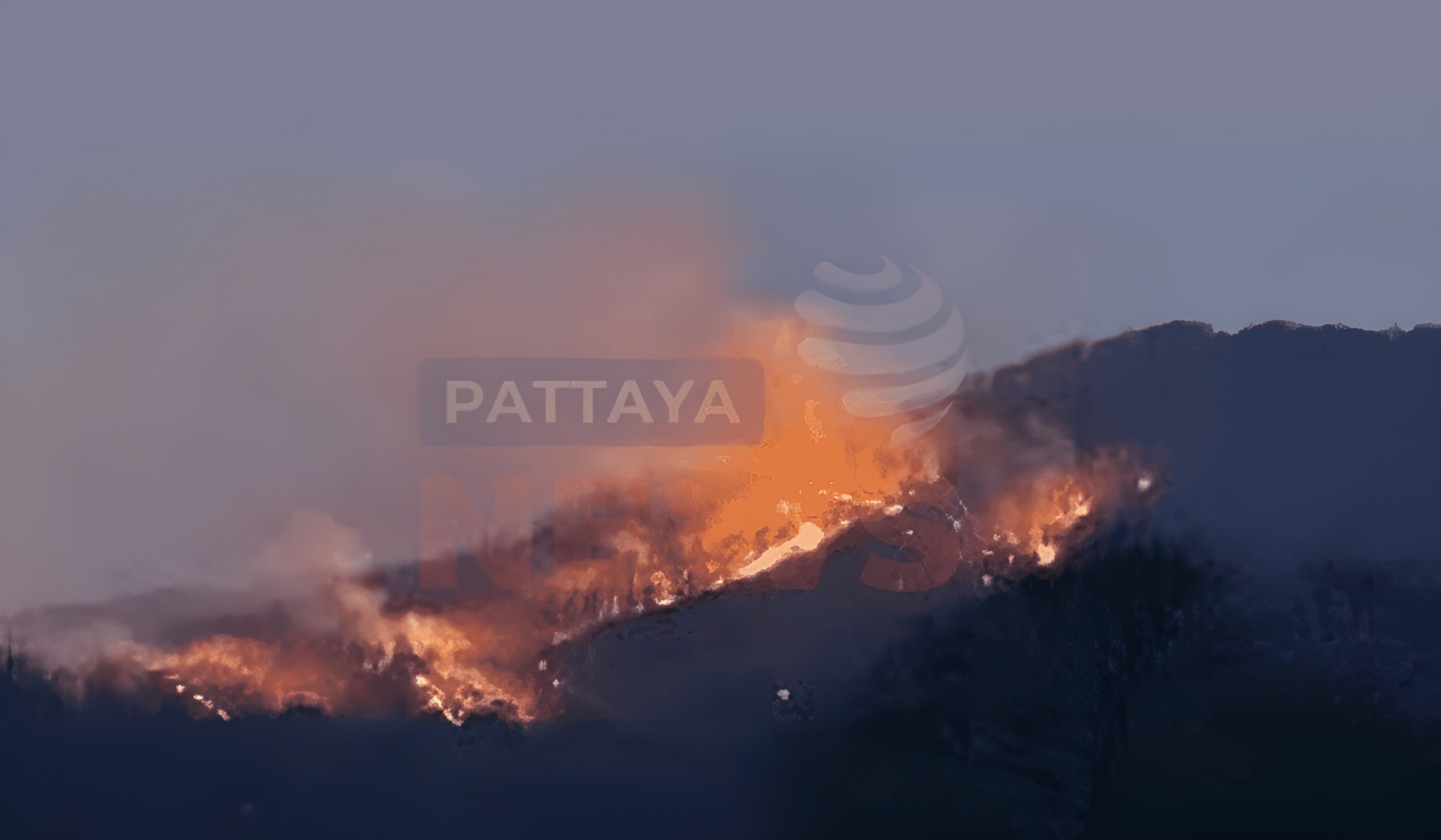
In a proactive move to combat the persistent issue of PM 2.5 dust and wildfires plaguing the northern provinces of Thailand, the Thai government has recently approved a groundbreaking project. Valued at a staggering 272 million baht, this initiative aims to address the root causes of air pollution and wildfire occurrences in the region. With concerns about public health and environmental sustainability at the forefront, the government’s decision marks a significant step towards creating a cleaner and safer environment for residents.
Before delving into the details of the government’s project, it is crucial to grasp the gravity of the situation regarding PM 2.5 dust and wildfires. PM 2.5 refers to fine particulate matter with a diameter of 2.5 micrometers or smaller, which can deeply penetrate the lungs and enter the bloodstream, posing severe health risks. These particles often originate from various sources, including vehicle emissions, industrial activities, and agricultural burning. Additionally, wildfires, exacerbated by factors such as climate change and land mismanagement, further contribute to the deteriorating air quality in northern Thailand.
The Impact on Public Health
The adverse effects of PM 2.5 dust and wildfires on public health cannot be overstated. Prolonged exposure to these pollutants is associated with respiratory issues, cardiovascular diseases, and even premature death. Vulnerable populations, such as children, the elderly, and individuals with pre-existing health conditions, are particularly susceptible to the harmful effects of air pollution. Moreover, the economic burden stemming from healthcare expenses and productivity losses underscores the urgency of addressing this pressing environmental issue.
Recognizing the urgent need for action, the Thai government has allocated substantial resources towards mitigating PM 2.5 dust and wildfires in the northern provinces. The approved project, valued at 272 million baht, encompasses a multifaceted approach aimed at tackling both the causes and consequences of air pollution and wildfires. Key components of the initiative include:
Strengthening Regulatory Measures

The government plans to enforce stricter regulations on industries, transportation, and agricultural practices to reduce emissions and minimize the incidence of wildfires. This may involve implementing emission standards, promoting cleaner technologies, and imposing penalties for non-compliance.
To effectively combat air pollution and wildfires, robust monitoring and surveillance systems are essential. The project will invest in advanced monitoring technologies, including air quality sensors and satellite imagery, to track pollutant levels and detect fire outbreaks in real-time. Additionally, community engagement initiatives will empower residents to report environmental violations and fire hazards promptly.
Promoting Sustainable Land Management Practices
Addressing the root causes of wildfires requires a holistic approach to land management. The government aims to promote sustainable agricultural practices, such as controlled burning techniques and crop diversification, to reduce the risk of uncontrolled wildfires. Furthermore, reforestation efforts and the restoration of degraded ecosystems will help mitigate the environmental impact of deforestation and land degradation.
Education and awareness play a pivotal role in fostering behavioral change and community resilience. The government will launch public awareness campaigns to educate residents about the health risks associated with air pollution and the importance of adopting sustainable practices. Additionally, capacity-building initiatives will provide training and support to local authorities and firefighting teams to enhance their response capabilities during wildfire incidents.
The Road Ahead
While the Thai government’s initiative represents a significant stride towards addressing air pollution and wildfires in the northern provinces, sustained efforts and collaboration are crucial to achieving long-term success. Continued investment in research, innovation, and infrastructure will be necessary to combat the complex challenges posed by PM 2.5 dust and wildfires effectively. Moreover, fostering partnerships with international organizations and neighboring countries can facilitate knowledge sharing and resource mobilization to tackle transboundary air pollution issues.
Conclusion
In the face of escalating environmental threats, the Thai government’s approval of a 272 million baht project to tackle PM 2.5 dust and wildfires in the northern provinces signals a commitment to safeguarding public health and environmental sustainability. By implementing a comprehensive strategy encompassing regulatory measures, monitoring technologies, sustainable land management practices, and public awareness initiatives, Thailand is poised to make significant strides in combating air pollution and wildfire hazards. As stakeholders unite in collective action, the vision of a cleaner, safer future for all becomes increasingly attainable.
Related posts:
Politics
Thai PM Srettha Thavisin Addresses Media Following Constitutional Court’s Petition Consideration
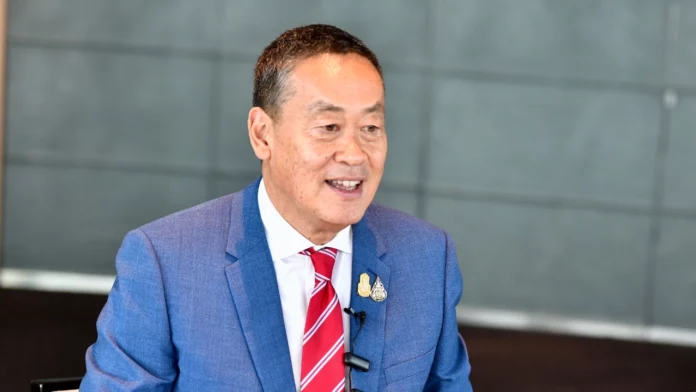
On May 23rd, 2024, at 4:30 PM (Japanese local time), Thai Prime Minister Srettha Thavisin, while on an official visit to Japan, spoke to the press about the Thai Constitutional Court’s consideration of a petition against him regarding the appointment of former Minister Pichit Chuenban.
Earlier that day, the Constitutional Court voted six to three to proceed with the petition against Srettha. However, by a narrow margin of five to four, the judges opted not to suspend him from his duties as Prime Minister during the investigation. The court granted him a 15-day period to respond to the complaint from the date he received a copy, as reported by Thai national media.
Srettha informed the media that he would consult with his legal team in response to the court’s order for an investigation. He underscored his responsibility as Prime Minister to govern the country and confront its challenges. While acknowledging that legal scrutiny is part of a political career, Srettha emphasized the importance of transparency and clarity in handling such matters.
“It is crucial to provide clarity to the public.”
Despite recognizing the difficulty in satisfying all political factions, Srettha appealed for trust in his leadership, emphasizing the well-being of Thai citizens as his foremost priority. He also expressed willingness to address any no-confidence motions in parliament, respecting the legislative process.
Srettha highlighted the roles of both the Legal Affairs and Executive Divisions in ensuring fair and thorough oversight. As part of the Administrative Division, he pledged to elucidate matters comprehensively and transparently to the public.
Related posts:
Politics
Thai Political Activist Group Protests at Government House in Bangkok, Demands Justice for Activist’s Death
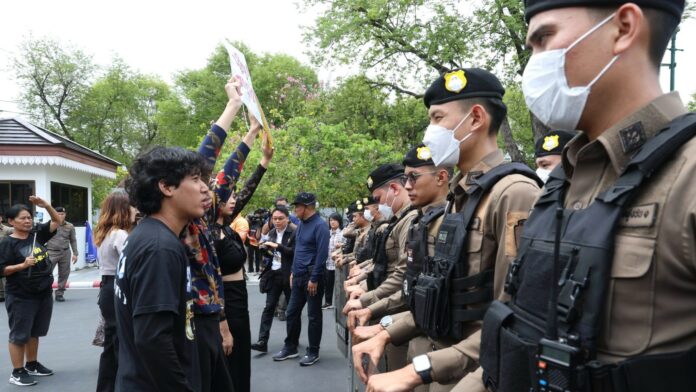
National News:
On May 21, 2024, at 11:30 AM, Thai national media reported that the Talufa Group held a protest at the Office of the Public Sector Development Commission (OPDC). They aimed to submit a letter to Mr. Somkid Chuekong, the deputy secretary-general of the Thai prime minister for political affairs, demanding justice in the investigation of Ms. Netiporn “Bung” Sanesangkhom’s death.
The activist group gathered at the OPDC to hear about the progress in Netiporn’s case. However, after an hour of protest, no official responsible for the case appeared to receive the letter.
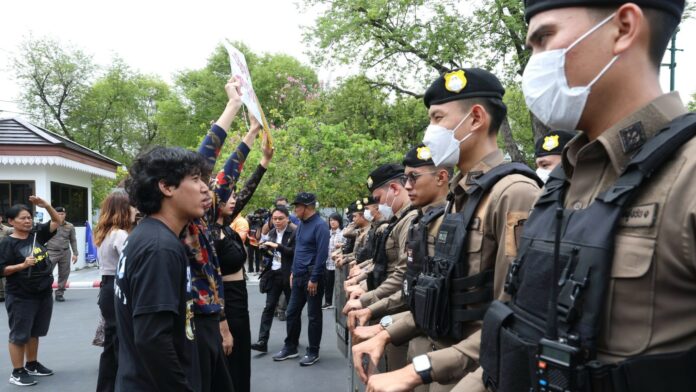
The group then moved to the Government House, where police officers prevented them from entering due to an ongoing cabinet meeting.
The Talufa Group publicly stated that the Pheu Thai Party had previously committed to considering amendments to Section 112 (Lèse Majesté) and granting amnesty to political prisoners under the same section. Despite the Pheu Thai Party being in power for ten months, there had been no response from the party, according to Thai national media.
After protesting in front of the Government House, the activists returned to the OPDC and successfully submitted the letter to Somkid.
Previously, a lawyer from the Thai Lawyers for Human Rights representing Netiporn had questioned the Thai Corrections Department regarding the cause of her death. However, the report was still pending, leaving the circumstances of Netiporn’s death in doubt, noted Kritsadang, the lawyer from Thai Lawyers for Human Rights.
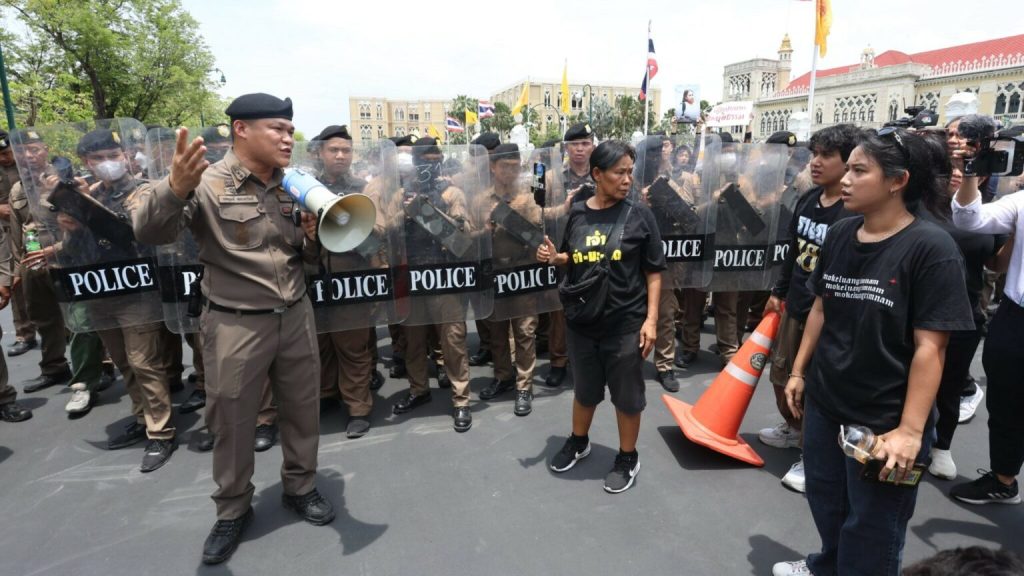
Related posts:
Politics
Thai Tourism Authority Seeks Increased Government Funding to Boost International and Domestic Flight Promotions
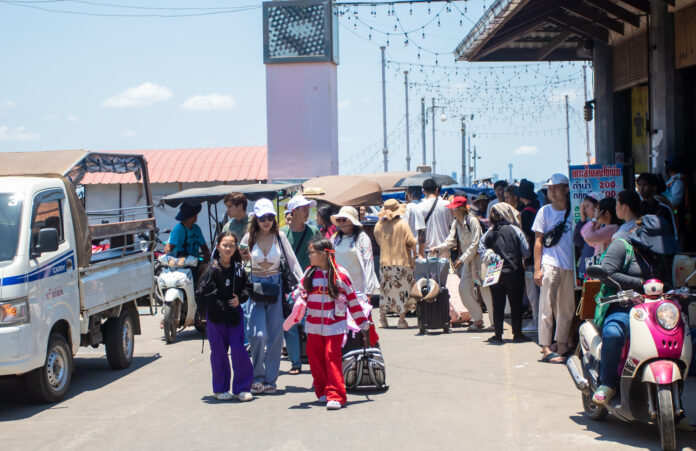
National—
On May 21st, 2024, Mr. Siripakorn Cheawsamoot, the Deputy Governor for International Marketing in Europe, Africa, the Middle East, and the Americas, requested financial support from the Thai government to bolster tourism markets through mutually beneficial alliances.
Despite the Tourism Authority of Thailand (TAT) receiving only a small portion of government funding, the TAT collaborated with various partners to promote remote marketing, particularly with international and domestic airlines, Siripakorn stated.
The TAT supported flights to both primary and secondary cities in Thailand. However, Siripakorn emphasized that the Thai government should increase financial support to enable more promotional activities with airline partners.
As Thailand approaches its high season in winter, there is an expected gradual recovery of airlines, with new airlines reportedly being approved to operate.
Furthermore, the TAT is exploring ways to assist airline operators in accessing Thailand’s aviation hubs via inter-indicators, Siripakorn added.
From April 2nd to 5th, 2024, over 20 airline representatives, in cooperation with public and private sectors, recognized the potential of Thailand’s aviation market and new routes during a meeting. Siripakorn reported that, with the high season approaching, four airlines are interested in launching new routes, offering a total of 200,000 seats by the end of the year.
Expanding flights to Thailand aligns with the Thai government’s strategy to enhance connections between Thai airports and international airports such as Istanbul-Bangkok and United Arab Emirates-Bangkok, along with charter flights. Additionally, new routes are now available from Middle Eastern airlines, Air Arabia, Air Canada, and others, Siripakorn noted.
Siripakorn also mentioned that in 2024, the TAT aims to generate tourism revenues totaling three trillion baht from both foreign and Thai tourists. However, Thai Prime Minister Srettha Thavisin has set a higher goal of 3.5 trillion baht.
“It is possible to generate over 3.5 trillion baht if the government approves financial support for the TAT,” asserted Siripakorn.
Related posts:
-
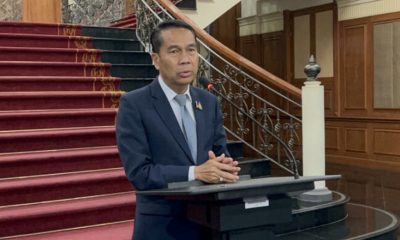
 Politics2 years ago
Politics2 years agoThai Defense Minister and Relevant Agencies Visit China for Submarine Procurement Discussion
-

 Entertainment2 years ago
Entertainment2 years agoPattaya Music Festival 2024 Begins This Friday
-
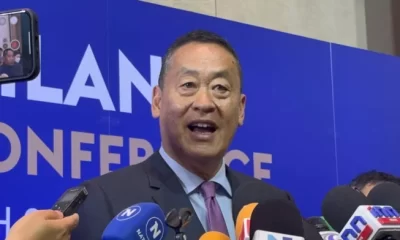
 Entertainment2 years ago
Entertainment2 years agoThai Parliament Votes to Deliberate Further on Opening Entertainment Complexes With Legal Casinos
-

 Entertainment2 years ago
Entertainment2 years agoPattaya Mayor Eyes Opportunity in Casino-Entertainment Complex Project, Jomtien Suggested as Prime Location
-

 Entertainment1 year ago
Entertainment1 year agoPattaya Sky Ride Grand Opens Offering Amazing and Thrilling Helicopter Tours
-

 Entertainment1 year ago
Entertainment1 year agoThailand’s Maya Bay Ranks 5th Among World’s Best Beaches, Pattaya Beach Ranks 12th
-
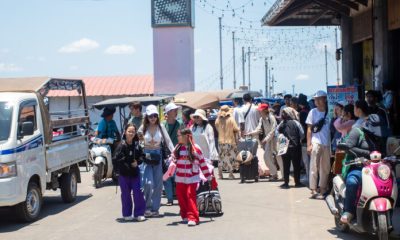
 Politics1 year ago
Politics1 year agoThai Tourism Authority Seeks Increased Government Funding to Boost International and Domestic Flight Promotions
-
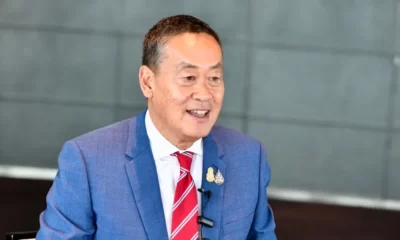
 Politics1 year ago
Politics1 year agoThai PM Srettha Thavisin Addresses Media Following Constitutional Court’s Petition Consideration




